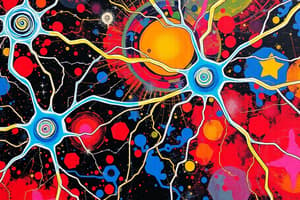Podcast
Questions and Answers
Which subdivision of the Peripheral Nervous System transmits information from the CNS to peripheral tissues?
Which subdivision of the Peripheral Nervous System transmits information from the CNS to peripheral tissues?
- Sympathetic Subdivision
- Somatic Motor Subdivision
- Efferent Subdivision (correct)
- Afferent Subdivision
Which of the following is a component of the Central Nervous System (CNS)?
Which of the following is a component of the Central Nervous System (CNS)?
- Ganglia
- Nerves
- Brain (correct)
- Spinal Cord (correct)
The Somatic Motor Subdivision is under conscious control.
The Somatic Motor Subdivision is under conscious control.
True (A)
The Autonomic Nervous System (ANS) is voluntary.
The Autonomic Nervous System (ANS) is voluntary.
What types of cells compose all neural tissue?
What types of cells compose all neural tissue?
The gap junctions in electrical synapses are very _____
The gap junctions in electrical synapses are very _____
What triggers the release of neurotransmitters from the axon terminal?
What triggers the release of neurotransmitters from the axon terminal?
Match the following subdivisions of the Autonomic Nervous System with their functions:
Match the following subdivisions of the Autonomic Nervous System with their functions:
Flashcards are hidden until you start studying
Study Notes
Organization of the Nervous System
- Divided into two main parts: Central Nervous System (CNS) and Peripheral Nervous System (PNS).
- CNS includes the brain and spinal cord, responsible for processing sensory information and coordinating responses.
- PNS consists of ganglia, nerves, sensory receptors, and the enteric nervous system, which is located in the digestive tract.
Functions of the CNS
- Receives sensory inputs from the PNS.
- Integrates inputs and determines appropriate responses.
- Initiates and coordinates actions, such as those performed by the cerebral cortex.
Peripheral Nervous System Subdivisions
- Sensory Subdivision (Afferent): Gathers and transmits information from peripheral receptors to the CNS.
- Motor Subdivision (Efferent): Transmits commands from the CNS to peripheral tissues (muscles, glands) to trigger actions like muscle contraction or secretion.
Efferent Subdivision of PNS
- Further divided into:
- Somatic Motor Subdivision: Controls voluntary skeletal muscles, operates under conscious control.
- Visceral Motor Subdivision (Autonomic Nervous System, ANS): Regulates involuntary muscles and gland secretion, operates unconsciously.
Autonomic Nervous System (ANS)
- Divided into two antagonistic subdivisions:
- Sympathetic Subdivision: Prepares the body for stress-related activities.
- Parasympathetic Subdivision: Promotes rest and digest activities.
- The balance between these subdivisions is crucial for physiological regulation.
Neural Tissue Composition
- Composed of two cell types:
- Neurons: Functional units that generate and conduct electrical signals.
- Glial Cells: Supportive cells that provide structure, regulate nutrient flow, and form blood-brain barrier; they also produce scar tissue after injury.
Glial Cells in CNS and PNS
- Both CNS and PNS contain specialized glial cells that support neuronal function.
- Neurons transfer information by converting chemical signals to electrical signals and vice versa.
Neuronal Communication Process
- Dendrites: Receive signals and translate them into Post-Synaptic Potentials (PSPs).
- If the PSP is substantial, the axon hillock generates an Action Potential (AP).
- The AP travels down the axon and triggers neurotransmitter release at the axon terminal to affect the target cell.
Synapses
- Involve both electrical and chemical signaling, with electrical synapses being rare.
- Gap junctions facilitate rapid communication between neurons through this process.
Studying That Suits You
Use AI to generate personalized quizzes and flashcards to suit your learning preferences.



